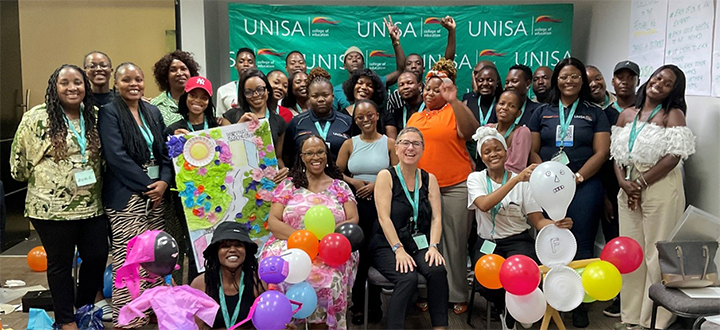College of Education
Unisa imagines the future of higher education
The College of Education (CEDU) recently hosted a thought-provoking seminar titled FutureLab: Being a Student at Unisa in 2050. The event invited CEDU students, alongside student leaders from the SRC and CEDUSA, and even students from other colleges across the institution, to explore what higher education might look like decades from now.

Middle, from left: Prof Mpine Makoe, Executive Dean: Unisa College of Education, and Prof Eva Cendon (FernUniversität, Germany)
The seminar, held to spark imaginative thinking about the future of teaching and learning, was facilitated by Prof Eva Cendon, a renowned academic from FernUniversität in Hagen, Germany. Cendon has worked closely with CEDU’s Executive Dean, Prof Mpine Makoe, on various projects related to the future of higher education, and her approach, known as FutureLab, was central to this workshop. The FutureLab methodology is built around a democratic, participatory process designed to empower participants in envisioning a more desirable future.
Makoe welcomed the attendees and emphasised the importance of their participation, particularly as future educators. She spoke of the value of imagining a world beyond current challenges, with a focus on how educators can better serve the needs of students in the years to come.
Makoe also made it clear that she would not actively participate in the seminar discussions, as she wanted students to feel free to voice their concerns and ideas without hesitation. The seminar unfolded in a unique three-phase process: Complaining, Imagining, and Creating.
In the first phase, students voiced the various challenges they currently face at Unisa. Common issues included technical difficulties such as system crashes during exam submissions, academic dishonesty concerns related to plagiarism tools, poor communication from university staff, outdated teaching methods, heavy workloads and insufficient support for mental health. Other concerns ranged from issues with admin staff and the violation of student rights, particularly regarding the protection of personal information under the POPI Act.
In the second phase, students were tasked with visualising these problems through art. Each group was asked to create drawings that depicted the challenges they had discussed. The artwork was displayed in a gallery format, where students from other groups could interpret the pieces and share what the artwork meant to them. This interactive activity allowed students to engage with each other's concerns in a creative, open-ended way.
In the final phase, students were invited to craft their vision of an ideal, futuristic Unisa. Using materials such as balloons, paper plates, raffles and coloured tissue paper. The students conceptualised a range of innovations for the year 2050; futuristic solutions and ideas that included an envisioned future where AI and data analytics would completely resolve technical issues like system crashes during assessment submissions, introducing a bar graph system that would measure student growth and proficiency over time.
Imagined innovations included the following:
- Biometric access for students using fingerprints, eliminating the need for student cards and enhancing security on campus.
- "Robot Zanele", an AI-driven assistant who would collaborate with human teachers to narrate stories and support classroom activities.
- "Robot Thato", designed to enforce academic integrity, including plagiarism checks and copyright compliance.
- "Robot Lwazi", an AI-powered assistant that would streamline communication, perform tasks more efficiently than humans, and be available 24/7 for student support.
- A fully automated Unisa, operated entirely by AI, where all operations are virtual, and graduations are held in the digital realm.
Cendon wrapped up the session by reflecting on the evolution of education. She highlighted that, while the utopian visions presented by the students were exciting, the journey towards this future would be gradual, with AI and other technological advancements gradually transforming higher education. The concept of a fully AI-operated university in 2050, though still a distant reality, served as a poignant reminder of how education is evolving and how essential it is to imagine and plan for the future.
The seminar was an enriching experience for all involved, encouraging students to not only envision the future of education but also actively participate in shaping it. Through the FutureLab process, attendees were empowered to think beyond the limitations of the present and contribute to a vision of a more dynamic, efficient and inclusive university environment. The event marked an important step in engaging Unisa’s students in discussions about the future of their education, offering a glimpse into the transformative potential of higher learning in the decades to come.
* By Freddy Mlambo, Acting Communication and Marketing Specialist, CEDU
Publish date: 2025/02/04

 Unisa co-hosts G20 community outreach in the Eastern Cape
Unisa co-hosts G20 community outreach in the Eastern Cape
 Unisans gain membership of prestigious science academies
Unisans gain membership of prestigious science academies
 Advocating for disability transformation through servant leadership
Advocating for disability transformation through servant leadership
 Unisa Press continues to illuminate the publishing space
Unisa Press continues to illuminate the publishing space